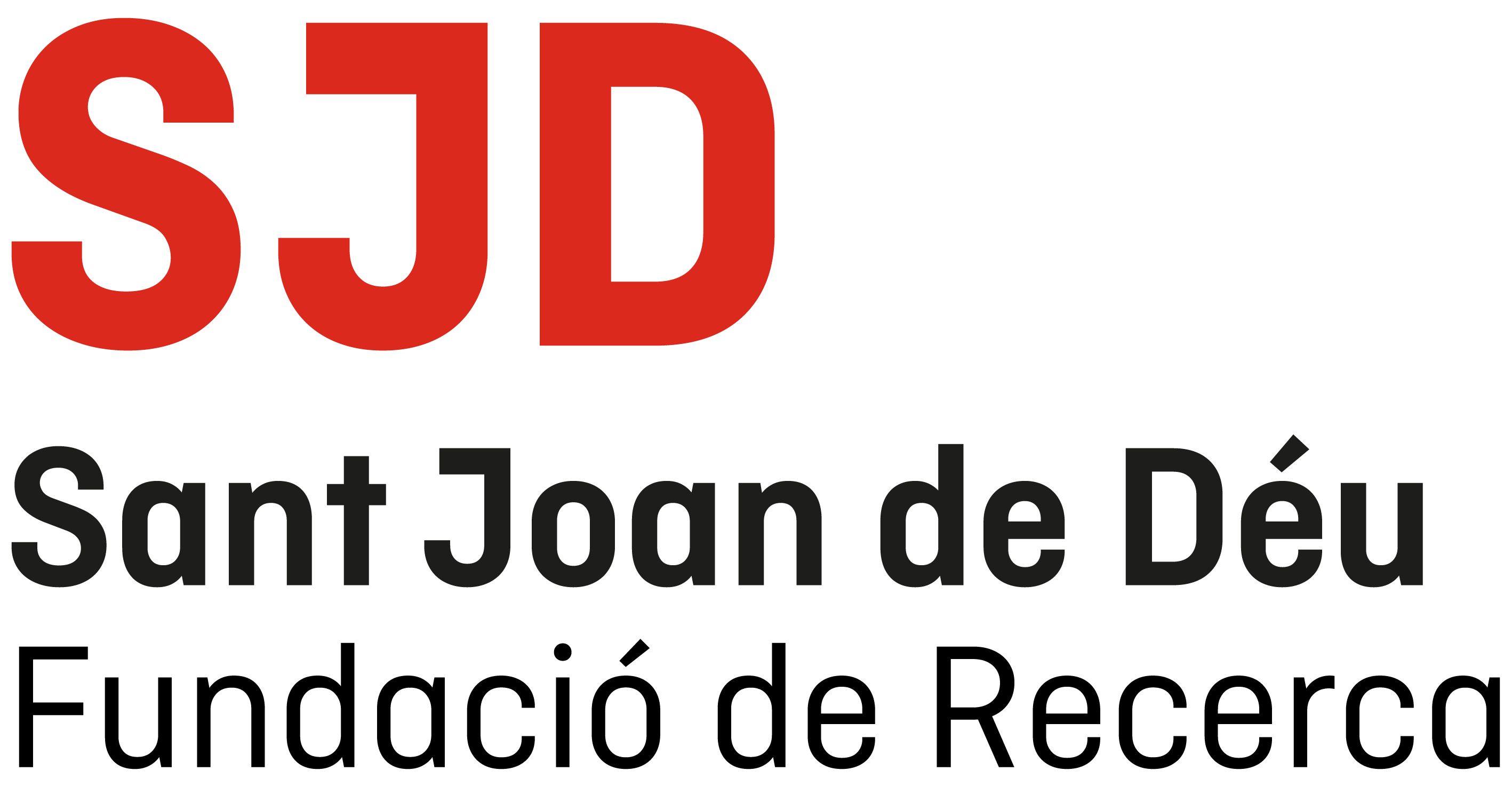

 Location: Barcelona (Spain)
Location: Barcelona (Spain) Working day: Full time
Working day: Full time Sector: Healthcare
Sector: Healthcare Vacancies: 1
Vacancies: 1 Discipline: R&D
Discipline: R&D Work modality: On site
Work modality: On siteThe Fundació Privada per a la Recerca Sant Joan de Déu is an entity created in 2002 to cover the research activity that is carried out, both in the biomedical and social sphere, at the Maternal and Infantile Hospital of Esplugues, in the Parc Sanitari de Sant Boi de Llobregat and in other centers of the Hospital Order San Juan de Dios - Province of Aragon San Rafael.
Our research has qualified and prestigious professionals, and we constantly want to incorporate into our teams the best scientific profiles. Working with us is working in a multidisciplinary hospitality environment, integrated within the assistance and aimed at providing a response to the needs of the people we assist.
Commitment with "HR Excellence in Research"
Research Foundation Sant Joan de Déu endorses the Requirements and Principles of the European Charter for Researchers, the Code of Conduct for the Recruitment of Researchers, and Open, Transparent, Merit-based recruitment promoted by the European Commission and follows Equal Opportunities policies. On September 2018, Research Foundation Sant Joan de Déu was awarded with the "HR Excellence in Research" logo. This recognition reflects the commitment of the Institute to the continuous improvement of its human resources policies in line with the Charter & Code. The Institution works to ensure fair and transparent recruitment and appraisal procedures.
Equality at Research Foundation Sant Joan de Déu
We’re committed to providing equal opportunities to talent from all backgrounds - all genders, racial/diverse backgrounds, abilities, ages, sexual orientations and all other unique characteristics that make you you.
Data Protection
The protection of your personal data is very important to us. By submitting an application, you grant Reserach Foundation Sant Joan de Déu permission to use the provided data for the recruiting process. (see Data Protection Policy in the job application)
Allegations and appeals
Candidates can present allegations to the way in which they have been evaluated and present the corresponding appeals writing to rrhh@fsjd.org. All the allegations received will be answered.

![]()
BCNatal CaixaResearch Artificial Placenta (AP) is an ambitious project funded by “la Caixa” Foundation, which objective is to develop an AP system for extreme premature babies. The AP system will allow fetal survival outside the womb in an environment that mimics the natural maternal conditions to minimize the risk of sequelae.
Context:
BCNatal | Fetal Medicine Research Center, directed by Prof. Eduard Gratacós, is a multidisciplinary research center focused on perinatal and fetal medicine, recognized as one of the best teams in the world in this field.
Our main strategic lines are fetal programming, new technologies and improving the clinical management of pregnancy complications.
BCNatal Fetal Medicine Research Center is integrated with BCNatal, a functionally unified clinical area resulting from the merger of the two largest maternal-fetal medicine departments in Barcelona (Hospital Clínic and Hospital Sant Joan de Déu, University of Barcelona).
BCNatal CaixaResearch Artificial Placenta is an ambitious project with funding from the “la Caixa” Foundation, whose objective is to develop an artificial placenta for extremely premature babies, which will allow the fetus to be kept outside the mother's uterus in an environment as similar as possible to it and thus minimizing the risk of sequelae. The artificial placenta will significantly decrease complications arising from extreme prematurity (and other fetal conditions), increasing survival and reducing the morbidity associated with extreme prematurity. Furthermore, in a more advanced phase, it would make possible interventions on the fetus in malformations or serious illnesses. Currently, it is estimated that up to 25,000 fetuses annually in Europe suffer serious problems, which could be operated on if the current difficulties in accessing the fetus did not exist.
Job description:
The ideal candidate for this position will be part of the technological development team that have as main objective the development of an artificial placenta (AP) prototype. This will be done by tackling the existing technical challenges and developing new solutions/components/devices to integrate into the current AP system.
What you will be doing and responsible for:
- Under the directives of your manager, take on responsibilities to implement new technical solution and/or optimize the existing ones to further develop the current AP prototype
- Design new set ups, assemble modules and research electrical/mechanical/fluidics parts which will be tested and successively integrated in the AP system
- Maintain and improve a system duplicate for testing of new prototypes and answering fundamental research questions
- Compile standard operating procedures, testing reports and other technical documentations relative your activity
- Facilitate the transition of new technology to the medical team
- Interface with the medical team as well as with potential suppliers in order to translate product requirements into suitable designs and prototypes
- Keep constant communication with the operational team in order to timely process feedback for further improvements of the AP system
Apply for this position if you:
- Are pro-active, organized, methodical and a hands-on technology person for the execution of the tasks of the project
- Have critical thinking to constantly search the solutions to the technical challenges keeping in mind the final application
- Have perseverance to tackle the technical challenges and are flexible to change plans until they are solved
- Have willingness and eagerness at all times to learn and implement new technologies as well as to study principles underlying biological systems
- Have collaborative, effective and open attitude to work side-by-side with your colleagues and medical doctors to achieve the common goals
- Feel truly motivated to be part of a project that aims to develop an AP prototype
- Don’t have any issues with being involved in a project that includes animal testing.
We offer:
- Immediate incorporation (is preferred).
- An indefinite contract
- In-person position, but remote working is allowed as long as it does not interrupt the work dynamic.
Days off:
- Personal days: 3
- Vacation days: 22
- Additional agreement days: 2 days at Easter and 4 days at Christmas
Your background will include:
- A technical/engineering degree (e.g. mechanical, biomedical engineering, bioengineer)
- At least 2 years prior experience in high-tech start-up companies and/or R&D projects in academia or a proven practical experience in works involving systems integration, prototyping, sensors or medical devices.
- Fluency in English
- Knowledge of physiological systems and biomedical signals, especially in the cardiovascular field (desirable)
- Knowledge of (bio)fluidic systems (desirable)
Documents to apply:
- CV
- Motivation letter